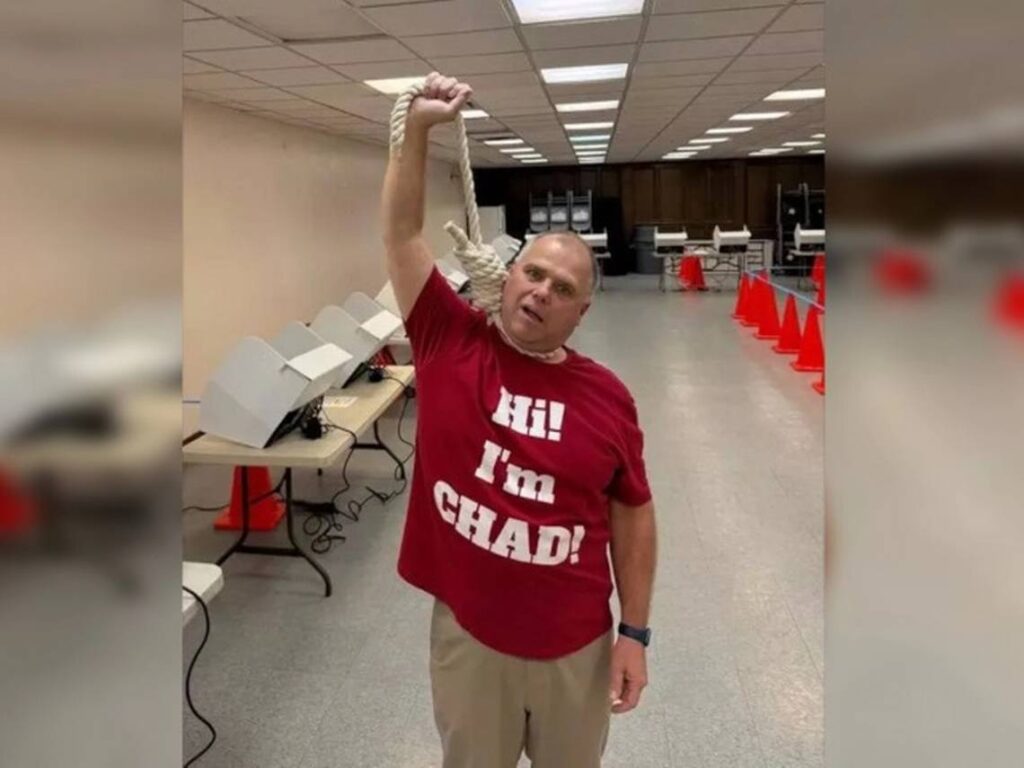Halloween, which occurs once a year, coincided this year with the first day of no-excuse early voting in Kentucky, leading to an unexpected intersection of politics and festive costumes. This crossover did not play out smoothly for Laurel County Clerk Tony Brown, who chose to dress up as a “hanging Chad.” The term “hanging Chad” gained notoriety during the contentious 2000 presidential election between Al Gore and George W. Bush, where the complexities of paper ballots and the concept of uncounted votes based on ballot manufacturing defects came to the forefront. While Brown likely intended to make a humorous reference to this infamous episode in election history, his choice of costume sparked controversy and backlash.
The costume consisted of a shirt reading, “Hi! I’m Chad” with a noose around his neck, which prompted criticism and concern. Later that evening, Brown posted an apology on the Laurel County Clerk’s office Facebook page, acknowledging that while he aimed for humor in referencing the Bush-Gore election, he ultimately misjudged the potential insensitivity of his costume. His apology highlighted an awareness of how certain symbols can evoke negative sentiments and emphasized that his intention was never to offend or hurt anyone. He expressed regret and took responsibility for his poor judgment on a day meant to symbolize civic engagement through early voting.
The situation intensified as the same day, a viral TikTok emerged, showcasing an incident where a voter claimed their ballot marked for Republican Donald Trump appeared to register as a vote for Democrat Kamala Harris. This video quickly gained traction across social media platforms, adding to ongoing discussions and misinformation surrounding election integrity, particularly in light of former President Trump’s unfounded claims of widespread voter fraud during the 2020 election. In response, Kentucky Attorney General Russell Coleman dispatched personnel to investigate the ballot-marking machine implicated in this issue, indicating the seriousness with which election officials approached voter concerns.
After initial investigations by Coleman’s office, it was determined that the issue recreated itself only once and was not replicated subsequently, leading to assurances from Coleman about the security of Kentucky’s election process. He reiterated this confidence on social media, emphasizing the strength of the state’s election system. This response aimed to quell fears and restore trust among voters, ensuring them that any potential malfunction would be rectified quickly and efficiently. The machine involved in the incident was subsequently removed from use, further demonstrating the commitment to electoral integrity and the thorough monitoring of equipment used in the voting process.
In the aftermath of Brown’s costume controversy, responses from the public varied. While some comments on his apology post expressed understanding and support, with people emphasizing his good character and good intentions, others labeled the costume as “unprofessional and distasteful.” The range of reactions reflects not just on Brown’s choices but also on broader societal norms regarding sensitivity and humor, particularly in the context of public office and civic duties. The complexity surrounding this event showcases the sometimes divisive nature of modern discourse, where humor can clash with a heightened awareness of social issues.
Despite the controversies, there was notable participation in the early voting process in Laurel County, where a total of 1,769 residents cast their votes, marking a 7% turnout on the first day. This figure, combined with absentee voting, highlights a proactive engagement by the community in the democratic process. Amidst the challenges faced by Brown’s office—the costume incident and the ballot confusion—there was also a sense of camaraderie from some community members who expressed their support for him. The multifaceted dynamics of this day encapsulate the sometimes unpredictable intersection of holiday celebration and essential civic duty, reminding us of the complexities that can arise when humor meets serious political processes. Brown, first elected in 2018, has been thrust into the spotlight yet again, leaving ample room for reflection on the responsibilities and perceptions tied to public service.

